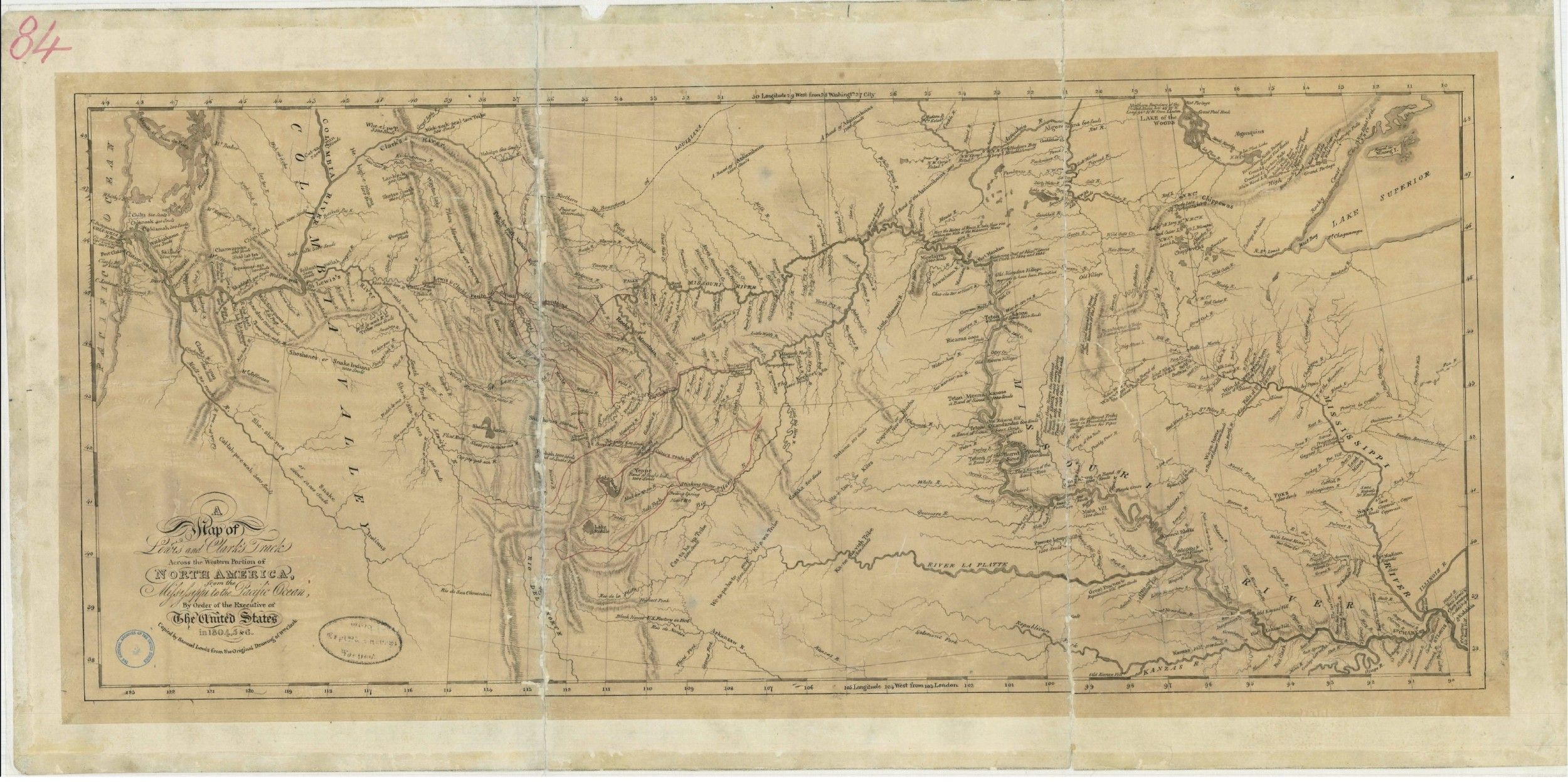Lewis and Clark Expedition: Two Viewpoints
Making Connections
All documents and text associated with this activity are printed below, followed by a worksheet for student responses.Introduction
This primary source analysis is about the Lewis and Clark Expedition. You and your partner will examine each of the 4 documents from either the perspective of the US Government/Lewis and Clark Corps of Discovery OR Native Americans that were impacted by the expedition.Name:
Class:
Class:
Worksheet
Lewis and Clark Expedition: Two Viewpoints
Making Connections
Examine the documents and text included in this activity. Fill in any blanks in the sequence with your thoughts and write your conclusion response in the space provided.List of Indian Presents Purchased by Meriwether Lewis in Preparation for the Expedition to the West
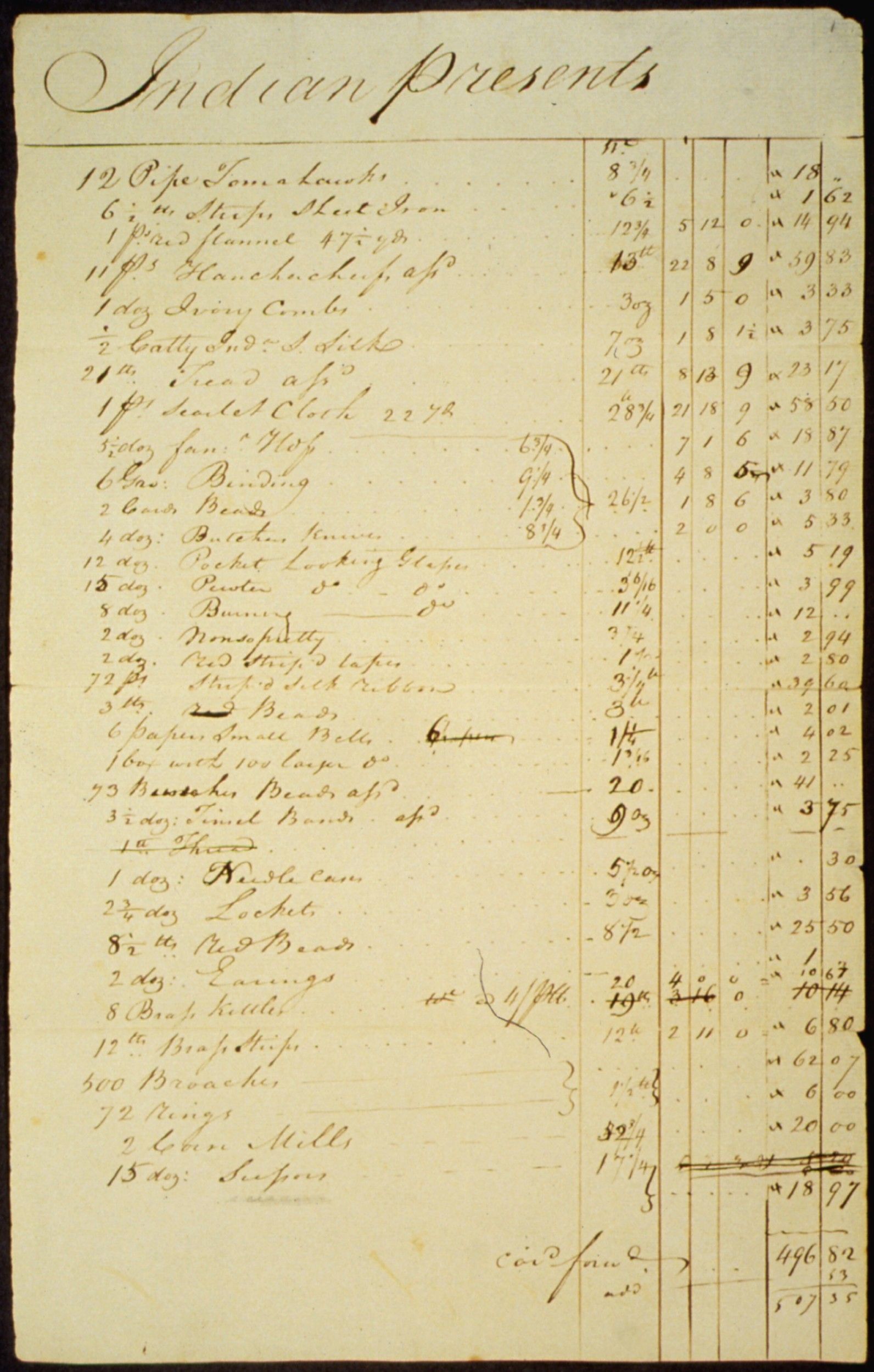
1. What type of document is this?
2. I think...
3. A question I have from my viewpoint is...
2. I think...
3. A question I have from my viewpoint is...
List of Purchases Made by Meriwether Lewis in Preparation for the Expedition to the West

1. What type of document is this?
2. I think...
3. A question I have from my viewpoint is...
2. I think...
3. A question I have from my viewpoint is...
President Thomas Jefferson Confidential Message to Congress Concerning Relations with the Indians

1. What type of document is this?
2. I think...
3. A question I have from my viewpoint is...
2. I think...
3. A question I have from my viewpoint is...
Map of Lewis and Clark Track Across the Western Portion of North America from the Mississippi to the Pacific Ocean

1. What type of document is this?
2. I think...
3. A question I have from my viewpoint is...
2. I think...
3. A question I have from my viewpoint is...
1
Activity Element
List of Indian Presents Purchased by Meriwether Lewis in Preparation for the Expedition to the West
Page 1

2
Activity Element
List of Purchases Made by Meriwether Lewis in Preparation for the Expedition to the West
Page 1

3
Activity Element
President Thomas Jefferson Confidential Message to Congress Concerning Relations with the Indians
Page 1

4
Activity Element
Map of Lewis and Clark Track Across the Western Portion of North America from the Mississippi to the Pacific Ocean
Page 1

Conclusion
Lewis and Clark Expedition: Two Viewpoints
Making Connections
Congratulations on completing the Circle of Viewpoints activity and partner discussion! Please show me your completed chart (you do not need to email me anything this time).Your Response
Document
List of Indian Presents Purchased by Meriwether Lewis in Preparation for the Expedition to the West
1803
This document lists "Indian Presents" purchased by Lewis in preparation for the expedition to the West. In a secret message to Congress on January 18, 1803, President Thomas Jefferson had asked for $2,500 to explore lands west to the Pacific. Jefferson worked closely with Lewis, co-commander of the expedition, to ensure that he was well-prepared to anticipate the party's needs. While the party ran out of such luxuries as whiskey, tobacco, and salt, they had plenty of rifles, powder, paper, and ink.
Transcript
Indian Presents12 Pipe Tomahawks | 8 3/4 | | | x 18 |
6 ½ lbs Strips Sheet Iron | 6 1/2 | | | 1 | 62
1 ps. red flannel 47 ½ yd | 12 3/4 | 5 | 12 | 0 | x 14 | 94
11 ps. Handkerchiefs ass[orted] | 13 | 22 | 8 | 9 | x 59 | 83
1 doz. Ivory combs | 3 oz | 1 | 5 | 8 | 9 | x 59 | 83
½ Catty Ind[ian] S. Silk | 7 oz | 1 | 8 | 1 ½ | x 3 | 33
21 lb Tread ass[orted] | 21 lb | 8 | 13 | 9 | x 23 | 17
1 ps. Scarlet cloth 22 yds | 28 ¾ | 21 | 18 | 9 | x 58 | 50
5 ½ doz fan: Hos | | 7 | 1 | 6 | x 18 | 87
6 gro: Binding | | 4 | 8 | 5 | x 11 | 79
2 card beads | 26 ½ | 1 | 8 | 5 | x 11 | 79
4 doz: butcher knives | | 2 | 0 | 0 | x 5 | 33
12 doz: Pocket Looking Glasses | 12 1/2 | | | | x 5 | 19
15 Doz: Pewter [ditto marks] | 3 3/8 | | | | x 3 | 99
5 doz: Burning [ditto marks] | | | | x 12 | |
2 doz. Nonesopretty| ¾ | | | | x 2 | 74
2 doz. Red Striped tapers | 1 ½ | | | | x 2 | 74
72 pr: striped silk ribbon | 3 ¼ | | | | x 39 | 60
3 lb: red beads | 3 | | | | x 2 | 01
6 papers Small Bells | 1 ¼ | | | | x 4 | 02
1 box with 100 larger [ditto marks] | 1 3/16 | | | | x 2 | 25
73 Bassahes Beads ass[orted] | 20 | | | | x 41 | |
3 1/2 doz: Tinsel Beads ass[orted] | 20 | | | | x 41 | |
1 Thread | | | | |
1 doz: Needle cases | 5 ½ oz | | | | | 30
2 ¾ Doz Lockets | 3 oz | | | | x 3 | 56
8 ½ red beads | 8 ½ | | | | x 25 | 50
2 doz: earrings | | | | | x 1 | |
8 brass kettles | 20 | 4 | 0 | 0 | x 10 | 67
12 lb Brass Strips | 12 lb | 2 | 11 | 0 | x 6 | 80
500 broaches | | | | | x 62 | 07
72 rings | 1 ½ | | | | x 6 | 00
2 corn mills | 52 ¾ | | | | x 20 | 00
15 doz: scissors | 17 ¼ | | | | x 4/8 | 97
| | | | |Confirmed | 496 | 82
| | | | | add | | 53
| | | | | |507 | 35
This primary source comes from the Records of the Office of the Quartermaster General.
National Archives Identifier: 300353
Full Citation: List of Indian Presents Purchased by Meriwether Lewis in Preparation for the Expedition to the West; 1803; Lewis and Clark Expedition; Consolidated Correspondence Files, 1794 - 1890; Records of the Office of the Quartermaster General, ; National Archives Building, Washington, DC. [Online Version, https://docsteach.org/documents/document/indian-presents, April 29, 2024]List of Indian Presents Purchased by Meriwether Lewis in Preparation for the Expedition to the West
Page 1
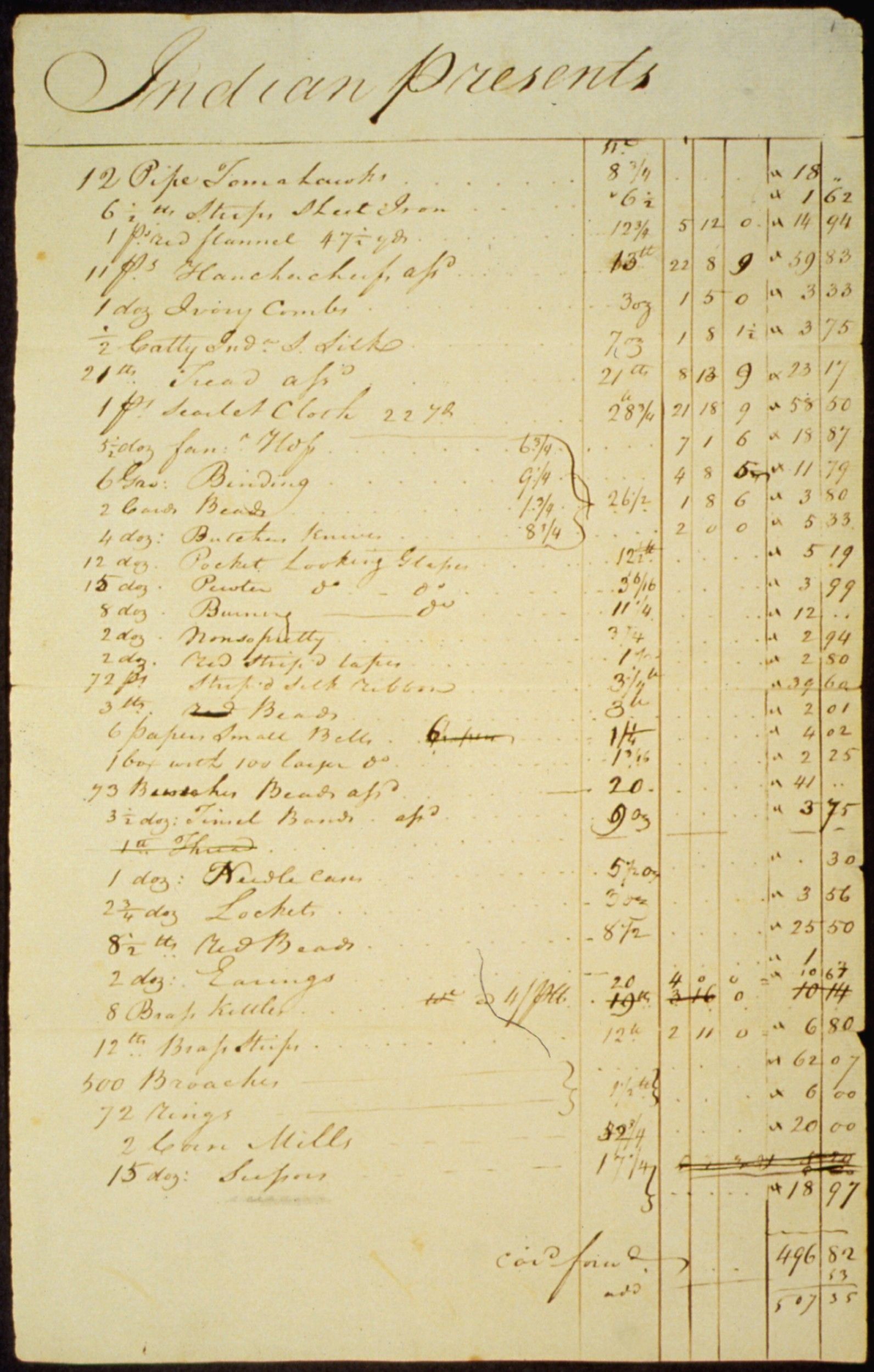
Document
List of Purchases Made by Meriwether Lewis in Preparation for the Expedition to the West
ca. 1803
In a secret message to Congress dated January 18, 1803, President Thomas Jefferson asked for $2,500 to explore lands west to the Pacific. Jefferson worked closely with Lewis, co-commander of the expedition, to ensure that he was well-prepared to anticipate the party's needs. While they ran out of such luxuries as whiskey, tobacco, and salt, they had plenty of rifles, powder, paper, and ink.
Transcript
[page 1]Mathematical Instruments . . . . . . . . . . . . . . . . . . . . 412.95
Arms, Ammunition & Accouterments. . . . . . . . . . . 182.08
Medicine &c . . . . . . . . . . . . . . . . . . . . . . . . . . . . . . . . 94.49
Clothing . . . . . . . . . . . . . . . . . . . . . . . . . . . . . . . . . . 317.73
Provisions, &c. . . . . . . . . . . . . . . . . . . . . . . . . . . . . . 366.70
669.50
Indian Presents (see below) . . . . . . . . . . . . . . . . . . 653.84
116.68
Camp Equipage___________________________118.30
2145.99
Indian Presents additional 15.67
2161.66
2160.13
1.53
2160.14
[page 2]
31
Recapitulation
Of
Purchases by
The Purveyors
For
Capt. Lewis
This primary source comes from the Records of the Office of the Quartermaster General.
National Archives Identifier: 300354
Full Citation: List of Purchases Made by Meriwether Lewis in Preparation for the Expedition to the West; ca. 1803; Records of the Office of the Quartermaster General, . [Online Version, https://docsteach.org/documents/document/list-of-purchases-made-by-meriwether-lewis-in-preparation-for-the-expedition-to-the-west, April 29, 2024]List of Purchases Made by Meriwether Lewis in Preparation for the Expedition to the West
Page 1
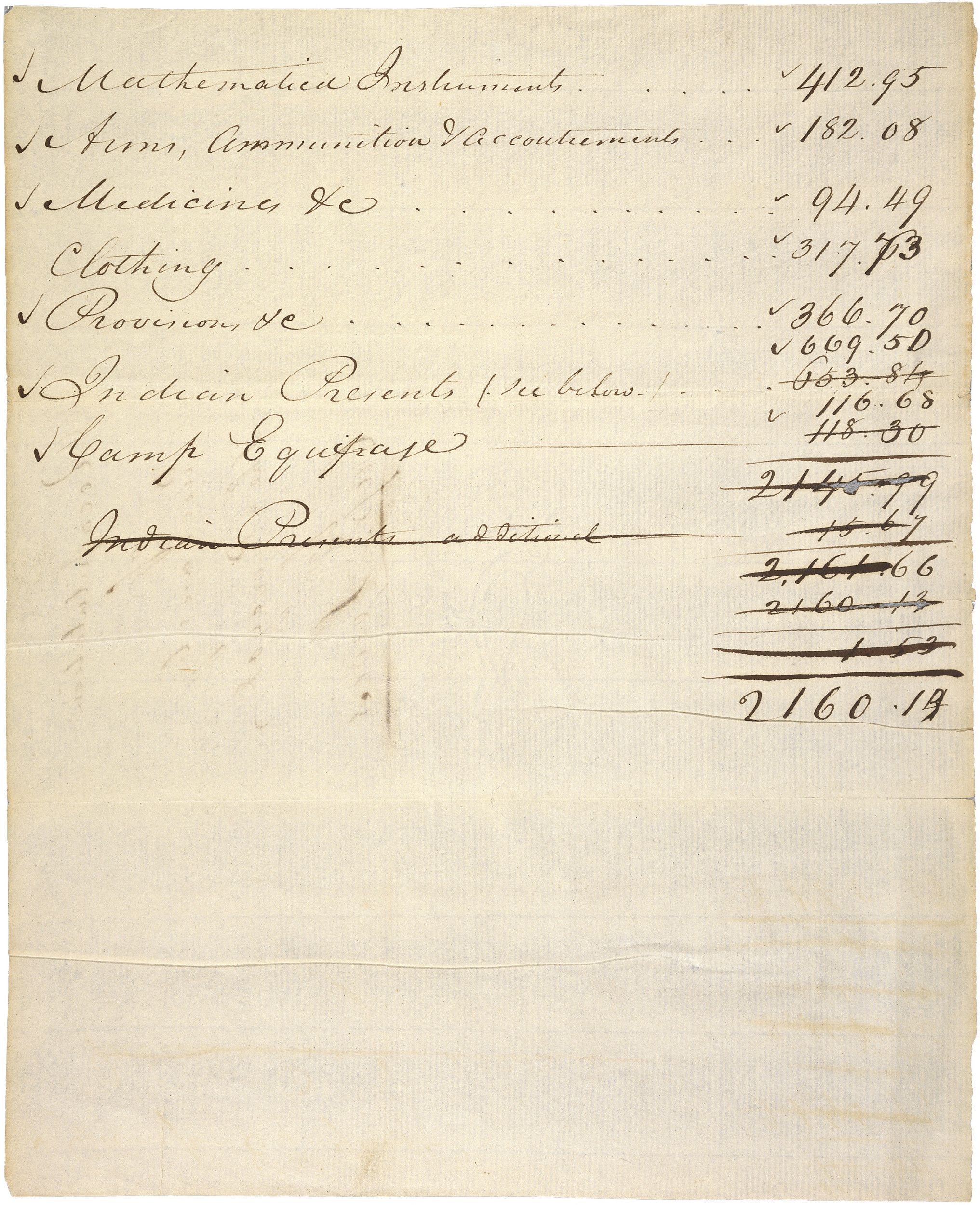
List of Purchases Made by Meriwether Lewis in Preparation for the Expedition to the West
Page 2

Document
President Thomas Jefferson Confidential Message to Congress Concerning Relations with the Indians
1/18/1803
On January 18, 1803, President Thomas Jefferson sent this secret message to Congress. In it, he asked Congress for $2,500 to explore the West – all the way to the Pacific Ocean. At the time, the territory did not belong to the United States. Congress agreed to fund the expedition that would be led by Meriwether Lewis and William Clark.
The modesty of the small request, explained principally in terms of promoting commerce, concealed the greater intentions of Jefferson's expansionist goals. Jefferson had long been interested in exploration of the North American frontier, and believed that the United States should stretch across the entire continent.
Jefferson instructed Lewis and Clark to seek new trade routes, to establish relations with the western tribes of American Indians, and to report on the geography, geology, astronomy, zoology, botany, and climate of the West. The 8,000-mile expedition provided the U.S. Government with its first glimpse of the vast lands that lay west of the Mississippi River, much of which it would acquire from France with the Louisiana Purchase.
President Jefferson worked closely with Meriwether Lewis to ensure that he was well prepared – anticipating what the party would need in the way of arms, food, medicines, camping gear, scientific instruments, and gifts for Indian tribes. They planned well. While the expedition ran out of such luxuries as whiskey, tobacco, and salt, they never ran out of rifles and powder, needed both for self-defense and food supply — and they never ran out of ink and paper, needed to record their findings.
The modesty of the small request, explained principally in terms of promoting commerce, concealed the greater intentions of Jefferson's expansionist goals. Jefferson had long been interested in exploration of the North American frontier, and believed that the United States should stretch across the entire continent.
Jefferson instructed Lewis and Clark to seek new trade routes, to establish relations with the western tribes of American Indians, and to report on the geography, geology, astronomy, zoology, botany, and climate of the West. The 8,000-mile expedition provided the U.S. Government with its first glimpse of the vast lands that lay west of the Mississippi River, much of which it would acquire from France with the Louisiana Purchase.
President Jefferson worked closely with Meriwether Lewis to ensure that he was well prepared – anticipating what the party would need in the way of arms, food, medicines, camping gear, scientific instruments, and gifts for Indian tribes. They planned well. While the expedition ran out of such luxuries as whiskey, tobacco, and salt, they never ran out of rifles and powder, needed both for self-defense and food supply — and they never ran out of ink and paper, needed to record their findings.
Transcript
ConfidentialGentlemen of the Senate, and of the House of Representatives:
As the continuance of the act for establishing trading houses with the Indian tribes will be under the consideration of the Legislature at its present session, I think it my duty to communicate the views which have guided me in the execution of that act, in order that you may decide on the policy of continuing it, in the present or any other form, or discontinue it altogether, if that shall, on the whole, seem most for the public good.
The Indian tribes residing within the limits of the United States, have, for a considerable time, been growing more and more uneasy at the constant diminution of the territory they occupy, although effected by their own voluntary sales: and the policy has long been gaining strength with them, of refusing absolutely all further sale, on any conditions; insomuch that, at this time, it hazards their friendship, and excites dangerous jealousies and perturbations in their minds to make any overture for the purchase of the smallest portions of their land. A very few tribes only are not yet obstinately in these dispositions. In order peaceably to counteract this policy of theirs, and to provide an extension of territory which the rapid increase of our numbers will call for, two measures are deemed expedient. First: to encourage them to abandon hunting, to apply to the raising stock, to agriculture and domestic manufacture, and thereby prove to themselves that less land and labor will maintain them in this, better than in their former mode of living. The extensive forests necessary in the hunting life, will then become useless, and they will see advantage in exchanging them for the means of improving their farms, and of increasing their domestic comforts. Secondly: to multiply trading houses among them, and place within their reach those things which will contribute more to their domestic comfort, than the possession of extensive, but uncultivated wilds. Experience and reflection will develop to them the wisdom of exchanging what they can spare and we want, for what we can spare and they want. In leading them to agriculture, to
manufactures, and civilization; in bringing together their and our settlements, and in preparing them ultimately to participate in the benefits of our governments, I trust and believe we are acting for their greatest good. At these trading houses we have pursued the principles of the act of Congress, which directs that the commerce shall be carried on liberally, and requires only that the capital stock shall not be diminished. We consequently undersell private traders, foreign and domestic, drive them from the competition; and thus, with the good will of the Indians, rid ourselves of a description of men who are constantly endeavoring to excite in the Indian mind suspicions, fears, and irritations towards us. A letter now enclosed, shows the effect of our competition on the operations of the traders, while the Indians, perceiving the advantage of purchasing from us, are soliciting generally, our establishment of trading houses among them. In one quarter this is particularly interesting. The Legislature, reflecting on the late occurrences on the Mississippi, must be sensible how desirable it is to possess a respectable breadth of country on that river, from our Southern limit to the Illinois at least; so that we may present as firm a front on that as on our Eastern border. We possess what is below the Yazoo, and can probably acquire a certain breadth from the Illinois and Wabash to the Ohio; but between the Ohio and Yazoo, the country all belongs to the Chickasaws, the most friendly tribe within our limits, but the most decided against the alienation of lands. The portion of their country most important for us is exactly that which they do not inhabit. Their settlements are not on the Mississippi, but in the interior country. They have lately shown a desire to become agricultural; and this leads to the desire of buying implements and comforts. In the strengthening and gratifying of these wants, I see the only prospect of planting on the Mississippi itself, the means of its own safety. Duty has required me to submit these views to the judgment of the Legislature; but as their disclosure might embarrass and defeat their effect, they are committed to the special confidence of the two Houses.
While the extension of the public commerce among the Indian tribes, may deprive of that source of profit such of our citizens as are engaged in it, it might be worthy the attention of Congress, in their care of individual as well as of the general interest, to point, in another direction, the enterprise of these citizens, as profitably for themselves, and more usefully for the public. The river Missouri, and the Indians inhabiting it, are not as well known as is rendered desirable by their connexion with the Mississippi, and consequently with us. It is, however, understood, that the country on that river is inhabited by numerous tribes, who furnish great supplies of furs and peltry to the trade of another nation, carried on in a high latitude, through an infinite number of portages and lakes, shut up by ice through a long season. The commerce on that line could bear no competition with that of the Missouri, traversing a moderate climate, offering according to the best accounts, a continued navigation from its source, and possibly with a single portage, from the Western Ocean, and finding to the Atlantic a choice of channels through the Illinois or Wabash, the lakes and Hudson, through the Ohio and Susquehanna, or Potomac or James rivers, and through the Tennessee and Savannah, rivers. An intelligent officer, with ten or twelve chosen men, fit for the enterprise, and willing to undertake it, taken from our posts, where they may be spared without inconvenience, might explore the whole line, even to the Western Ocean, have conferences with the natives on the subject of commercial intercourse, get admission among them for our traders, as others are admitted, agree on convenient deposits for an interchange of articles, and return with the information acquired, in the course of two summers. Their arms and accoutrements, some instruments of observation, and light and cheap presents for the Indians, would be all the apparatus they could carry, and with an expectation of a soldier's portion of land on their return, would constitute the whole expense. Their pay would be going on, whether here or there. While other civilized nations have encountered great expense to enlarge the boundaries of knowledge by undertaking voyages of discovery, and for other literary purposes, in various parts and directions,
our nation seems to owe to the same object, as well as to its own interests, to explore this, the only line of easy communication across the continent, and so directly traversing our own part of it. The interests of commerce place the principal object within the constitutional powers and care of Congress, and that it should incidentally advance the geographical knowledge of our own continent, cannot be but an additional gratification. The nation claiming the territory, regarding this as a literary pursuit, which is in the habit of permitting within its dominions, would not be disposed to view it with jealousy, even if the expiring state of its interests there did not render it a matter of indifference. The appropriation of two thousand five hundred dollars, "for the purpose of extending the external commerce of the United States," while understood and considered by the Executive as giving the legislative sanction, would cover the undertaking from notice, and prevent the obstructions which interested individuals might otherwise previously prepare in its way.
TH. Jefferson
Jan. 18. 1803.
This primary source comes from the Records of the U.S. House of Representatives.
National Archives Identifier: 306698
Full Citation: President Thomas Jefferson Confidential Message to Congress Concerning Relations with the Indians; 1/18/1803; President's Messages from the 7th Congress; (HR 7A-D1); Presidential Messages, 1791 - 1861; Records of the U.S. House of Representatives, ; National Archives Building, Washington, DC. [Online Version, https://docsteach.org/documents/document/jefferson-confidential-message-relations-indians, April 29, 2024]President Thomas Jefferson Confidential Message to Congress Concerning Relations with the Indians
Page 1
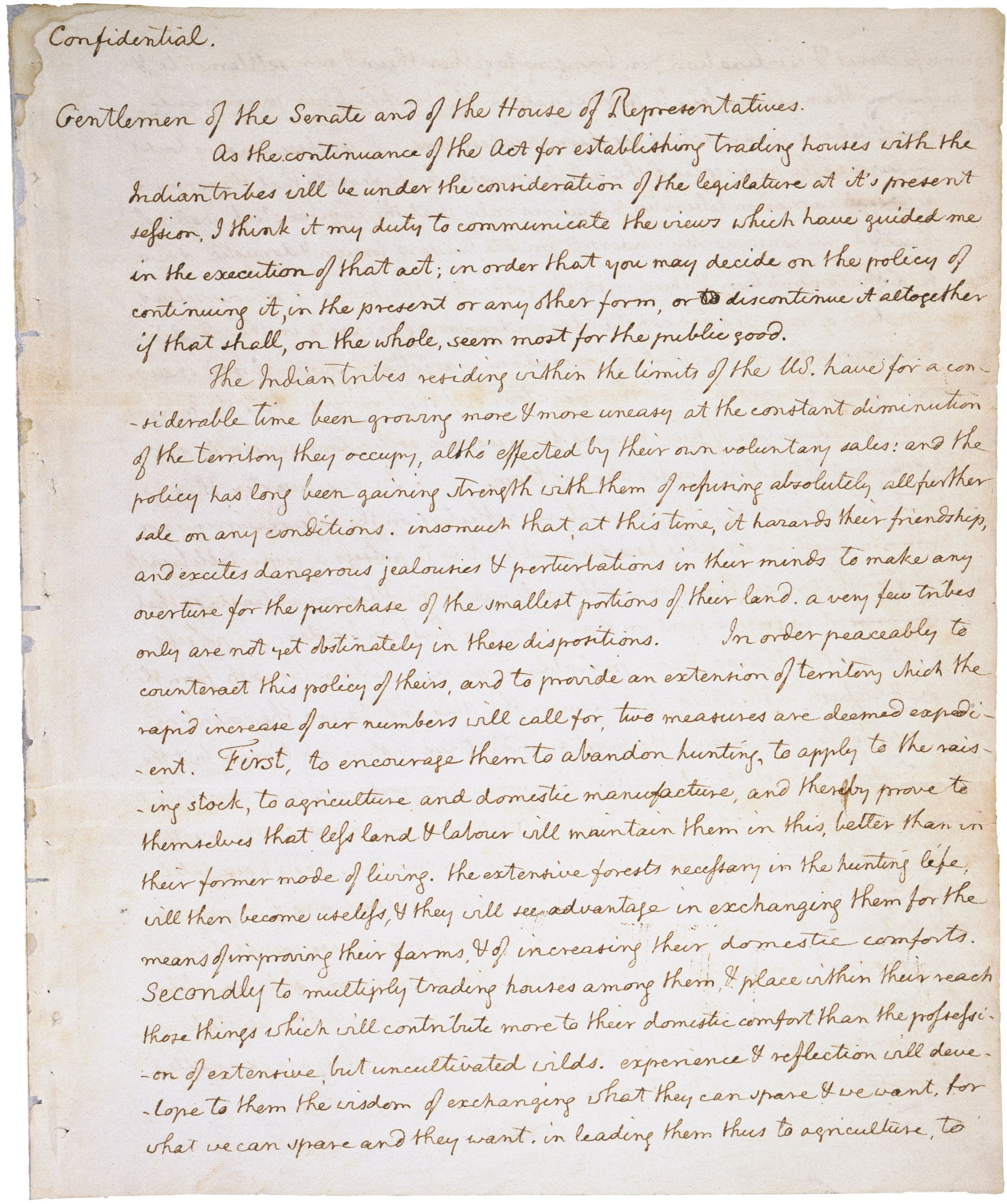
President Thomas Jefferson Confidential Message to Congress Concerning Relations with the Indians
Page 2
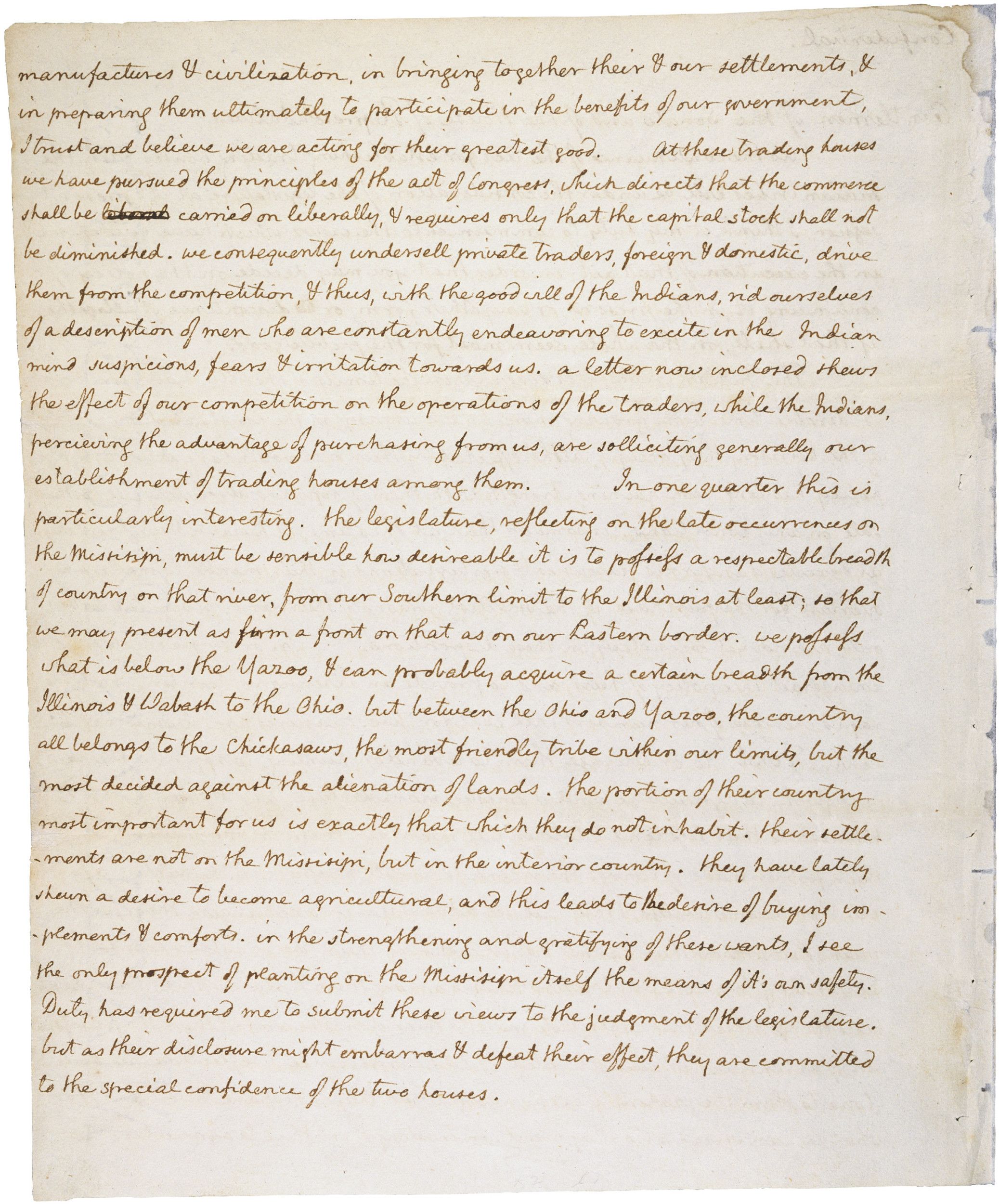
President Thomas Jefferson Confidential Message to Congress Concerning Relations with the Indians
Page 3
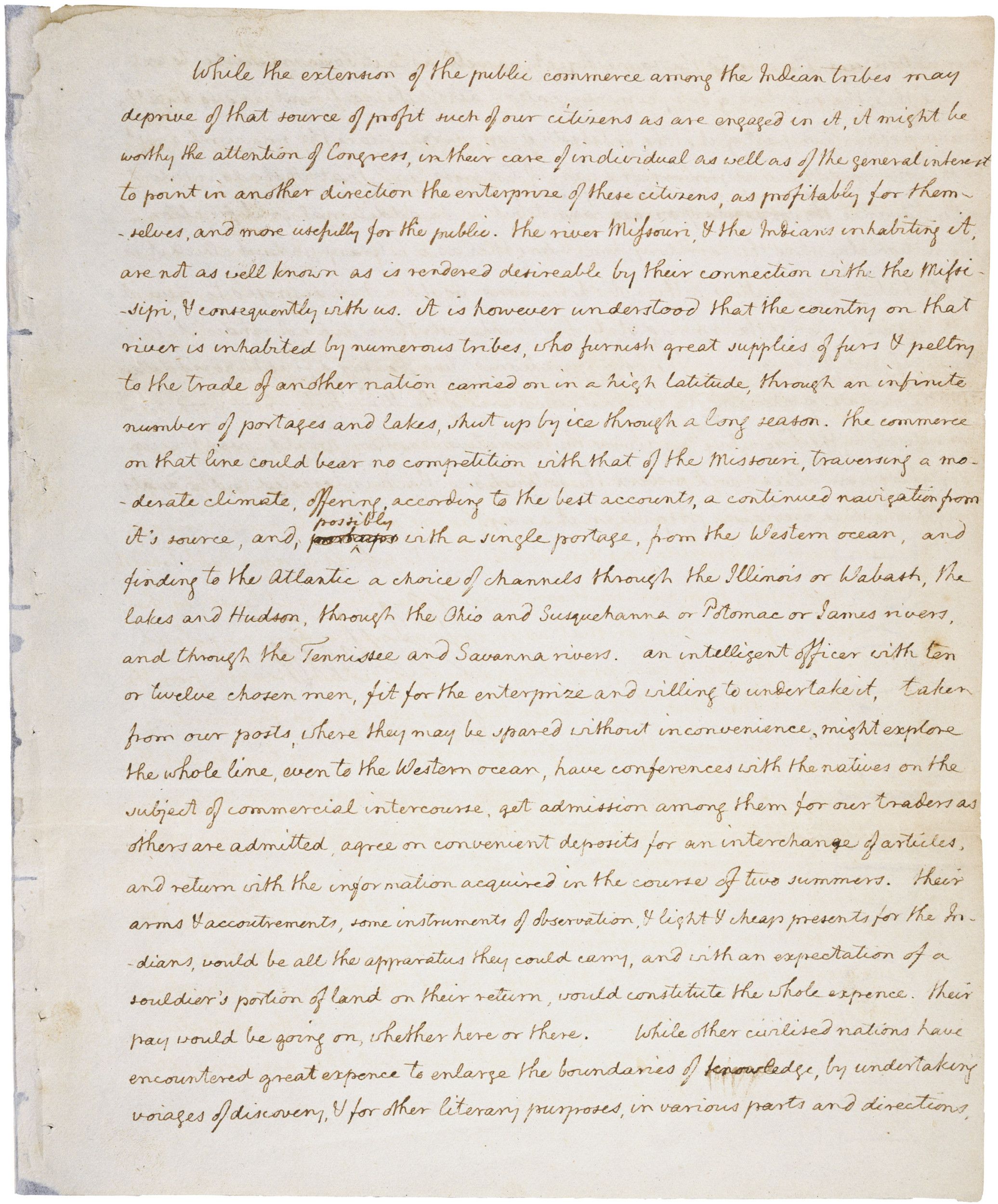
President Thomas Jefferson Confidential Message to Congress Concerning Relations with the Indians
Page 4
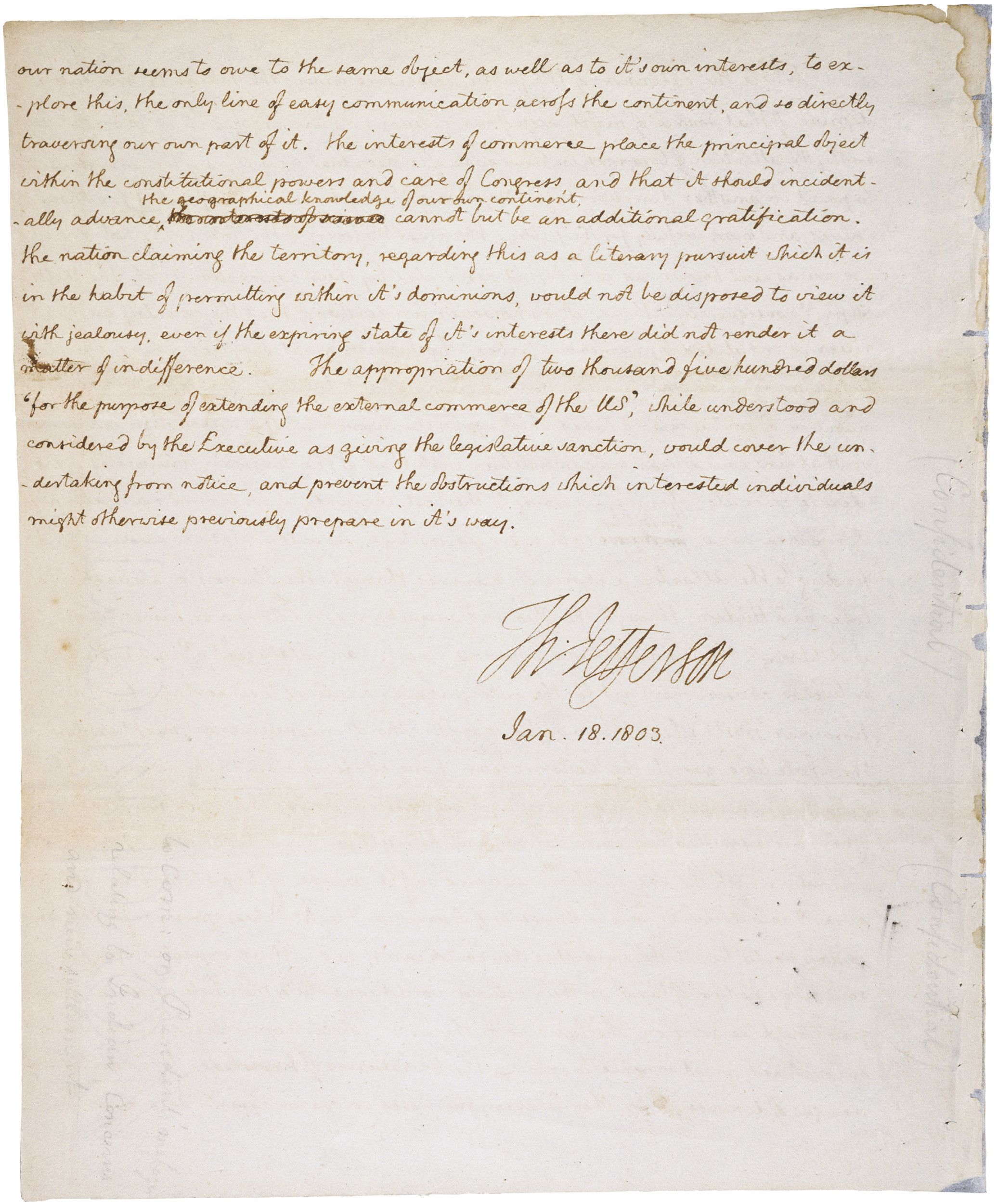
Document
Map of Lewis and Clark Track Across the Western Portion of North America from the Mississippi to the Pacific Ocean
ca. 1806
This primary source comes from the Records of the Office of the Chief of Engineers.
National Archives Identifier: 5900021
Full Citation: Map of Lewis and Clark Track Across the Western Portion of North America from the Mississippi to the Pacific Ocean; ca. 1806; Records of the Office of the Chief of Engineers, . [Online Version, https://docsteach.org/documents/document/map-lewis-clark-track-across-usa, April 29, 2024]Map of Lewis and Clark Track Across the Western Portion of North America from the Mississippi to the Pacific Ocean
Page 1
